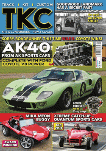
STEVE HOLE tells the story of Peter Springall, who along with VW Derrington and Mota-Lita changed the way we steered our cars with their after-market steering wheels that literally took off.
During the boom period of the go-faster accessories market of the sixties, the replacement steering wheel could, said the adverts, could turn your Corsair into a Lamborghini Miura. Hmmm. Maybe, but probably not, let’s be honest.
One of the first companies, if not the first, to attack the aftermarket was Vic Derrington with his wooden-rimmed steering wheel, which sold like the proverbial hot baked goods, for many years. Indeed, find one today and it will command a princely sum.
Second to market was Peter Springall of Berwick-on-Tweed. He responded to an advert in Motor Sport magazine in 1957 where Connaught Racing was looking for a company to make steering wheels for them. A car enthusiast he would often make a steering for his friends.
Springall set to. He designed and crafted a very large wooden-rimmed wheel, which they rejected. However, it put Springall on the map and he persevered making each wheel himself. He always reckoned that the boom in Specials in the late fifties established his business, with most being based around Austin 7 or Ford 10 mechanicals.
The arrival of the Mini and Austin Healey Sprite was also good news for Springall’s business.
The explosion of the steering wheel market (for many years they were one of the leading Christmas presents for dads around the UK) really helped Derrington, Springall and the maestro that is Simon Green, founder of Mota-Lita.
Springall’s first big order came from Lotus who wanted to use his wheels as OE fitment on the Lotus Elite, followed by the Elan and then as an option on the Seven S2. It was three years before Springall employed his first staff member and moved to ‘proper’ premises.
Ford’s works rally team used his wheels, as did Alan Mann Racing, while the Lotus Cortina had a Springall Triple 6 fitted as standard. Some of the leading racing drivers of the day used Springall steering wheels on their cars – names such as Jack Brabham, Dan Gurney and Jim Clark.
It wasn’t long before cheap alternatives started to find their way to market. Some were pretty good, like Brown & Geeson’s Motec Competitor or the wheel made by the marvellously named Brian Bookbinder of Gran Pree Distribution or even those produced by Astrali.
The problem was that there were some shockingly bad ones. A cruddy steering wheel can be dangerous and there were stories of drivers being injured by wooden wheels with metal spokes collapsing during an accident.
Luckily this didn’t seem to affect the quality end of the market and for the first eight years of existence, Springall’s business increased turnover by 50 per cent each year.
When the shrewd businessman and aftermarket goodies supplier, Michael Christie of Alexander Engineering saw the potential of Springall’s products he did an exclusive deal with Peter. Christie was great at marketing and could offer superb distribution.
He suggested to Springall that he should not only allow Alexander to distribute his steering wheels but to collaborate with them and create a new brand as a joint venture under the Springalex (‘Spring’ from Springall and ‘Alex’ from Alexander) name.
This very successful arrangement remained in place for fifteen years. The Springalex range was massive covering fitments for most mainstream makers, which naturally included plenty of kitcars running around with their steering wheels.
Springalex Sales Ltd was based at Alexander Engineering’s base in Haddenham, Buckinghamshire. They plundered the cheaper end of the market very successfully and the line-up included the Deluxe, SA100 Safety, Hide and Standard Wood steering wheels. They recognised the heritage and early successes that Peter Springall had enjoyed. It was just a shame that they made a huge gaffe on the cover of their sales catalogue claiming that F1 world champion ‘Jim Clarke’ (sic) endorsed their steering wheels.
All early Springall wheels were wood-rimmed – for at least five years – then came a switch to almost exclusively wood-rimmed wheels, which was where the boom in sales came. Springall’s wheels remained available and were definitely at the top end of the market.
After dissolving their relationship with Alexander Engineering, Springall then teamed up with another, smaller distribution company called ACMC.
It was they who encouraged Peter to come out with another budget range of steering wheels, vinyl-wrapped ones, this time under the Tema name, with the top of the range sold under the ‘Springall’ brand name as usual.
After the ‘make hay’ period, the aftermarket, including steering wheels, went into a steep decline from the early seventies, primarily due to the mainstream motor manufacturers fitting better quality steering wheels to their cars as standard, although interestingly Springall Ltd enjoyed their best ever year as late as 1978.
If you think times are tough now, ask an older relative what Britain was like during the first three or four years of the seventies, what with strikes, power cuts and three-day weeks.
Peter Springall continued until 1978 when I think the company shut its doors with his retirement.
I was pleased to see that the name lives on as an unrelated company is making ‘replica’ Springalex steering wheels today and you can find out more via www.springalexltd.com.









